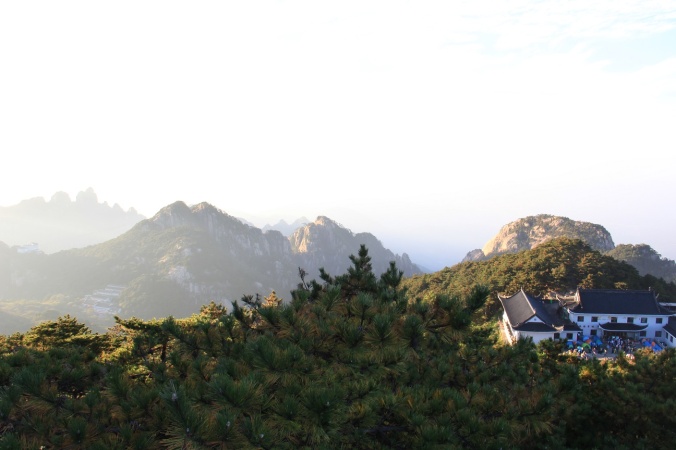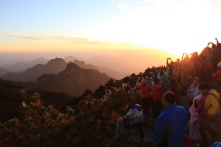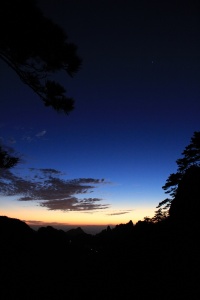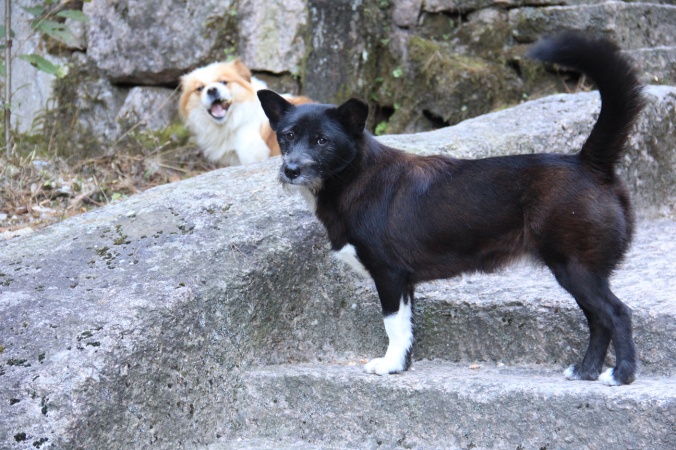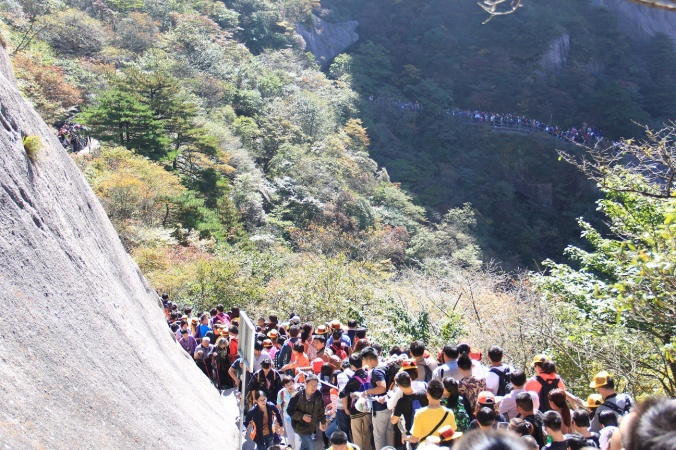Holidays being what they are, I wasn’t able to get a bus out of Hangzhou until three hours after the first one left, which crimped my plans for climbing Huangshan.
Rising out of the Anhui bamboo forests, the Huangshan range is known for its jagged and jutting granite peaks thrusting more than 1,800 meters out of a sea of clouds into the blue. The mountain, which translates as Yellow Mountain in English, inspired an entire school of Chinese painting. Now a UNESCO World Heritage Site, the peak has held renown in China for more than 2000 years, and some of its 10,000 steps are said to have been constructed as long as 1,500 years ago. Today it’s one of the most popular tourism sites in China and, being located just a few hours from Hangzhou, I got it into my head to climb it.
The only problem was, given those 10,000 steps, Huangshan isn’t the easiest climb. And since I wanted to summit before sunset, my three-hour delay, coupled with one of China’s ubiquitous traffic jams, was jamming up my plans.
There are two main routes up the mountain – well three if you count the three different cable cars, which I don’t – a 15-kilometer climb among some of the mountains most well-known geologic features or a 7.5-kilometer climb up the east side. I’d planned on the long route, but given my time constraints, I decided on Option 2. Still, by the time I’d bought my ticket and taken the shuttle to the base, it was already 3 p.m.
My guidebook says the climb takes 2.5 hours. The sun starts to set at 5:30 p.m. I was going to have to run.
So I did. Taking steps two at a time and dappling the stones with my sweat, I hoofed the four-mile climb in an hour and a half, shrugging off the shouts of “Look, look! Running foreigner!” and even stopping to snap some pictures and make some new friends, two of which mentioned they’d each make an excellent girlfriend. I declined.
And then I was at the top.
I’d packed a borrowed tent with plans to camp at the summit, but I had no sleeping bag and no pad, only a light down jacket and a pair of gym shorts. Two days before, I read that the temperatures were dropping to the high 30s some nights, so I’d booked a room at the White Goose Hotel at the summit at the last minute, figuring it would be better to pay outrageous prices than spend the night freezing on a block of concrete.
I hiked one more set of stairs and found the place, then checked in to my bunk in the hotel basement. Nice enough for a night, though not for 70 bucks.
Then it was off for the sunset.
By the time I reached Guangming Peak, the second highest of Huangshan’s spires, nearly every piece of ground was supporting at least a body and a half. I scrambled around, climbing trees, balancing on fence posts – sometimes with the help of my new friends – snapping whatever pictures I could. Below, wisps of haze went red, then purpled as they embraced the rolling hills which gently shaded the sun as dusk turned to night. Behind, the rock faces caught the last light before they, too, faded into the gloom.
As I walked back to the hotel, I realized I’d made my second big mistake: Food. I didn’t have any, I hadn’t eaten any, and there didn’t seem to be any.
I bought a pack of cookies for four dollars, and went to find my bed, tripping all the way over the darkened stairs.
Turned out, sometime in between checking in and taking pictures, someone else had taken it. And every other bed in my basement room. That wasn’t all: By this time, beds had appeared in all the hallways and all the lobbies. Outside on the basketball court, nearly 100 tents were packed side to side in a scene that was being repeated all over the mountain, wherever tents were allowed. Where they weren’t, police were chasing off would-be sleepers.
I realized I might be in trouble.
I went up to the service desk. She drug me back down and the questioning began. We went through everyone’s receipts. After much denial, it turned out a middle-aged man tucked in to his spectacles had taken my bed in confusion.
“We can switch, OK?” he pleaded. “Ok?”
Ok.
The attendant showed me to my new room. I had the corner bunk. Pushed together with some other bunks. Shared with other people. At least it would be warm, I thought.
I followed the attendant back upstairs, where I started a pretty typical conversation: “Where are you from? How old are you? Where do you live? You’re Chinese is so good … blah blah blah.” Then, it took a weird turn.
“So,” all three young women behind the desk turned to look at me.
“Do you think Chinese girls are pretty? Do you think they’re prettier than American girls? Are Chongqing girls or Anhui girls prettier? What about Shandong girls?”
“Are you married?”
“Do you want to be?” one of them practically shrieked.
I hadn’t noticed that a crowd had gathered. It erupted in cackles. My ears flushed. I dissembled.
“Yeah, Beijing is pretty far away,” she said.
“Yeah,” I mumbled, looking at my feet and wishing beer didn’t cost 20 yuan a can.
After a half hour of conversation with this person and that, the lights at last went out. I went downstairs to find a room of snoring men. I clambered into bed with them, snuggled up, and tried to sleep.
My alarm went off at 4:30 a.m. Sunrise at 5:40, and I had a couple of kilometers to cover in the meantime. I grabbed my bag, and lurched into the dark.
Down, up, down again, more up, passing crowds of people on the half-lighted steps along the summit paths. In no time, my hat, gloves, and sweatshirt came off. Wherever I got, 1000 people had gotten first. I tried to force my way up to the cliff edges to get a clear look. Nothing. As the clouds started to brighten, I lucked upon a security guard opening a gate to a previously closed peak. The rusty gate creaked open, and I darted up the steps. Fifth one on the top, with prime position. Finally. More shades of red, this time the morning. Below, the cloud sea lapped at the lower peaks, and early rays silhouetted the pinnacles in pinks.
- The last stars wink out over Huangshan.
- Sunrise Illuminates Huangshan’s valleys.
In less than 12 hours, I’d seen the sun fall and rise on the slopes of Huangshan.
But I had miles to go.
My plan for the day was to hike the West Sea Canyon, regarded by many as the most beautiful hike in the park, then to slide down the West Steps that I’d shunned the day before.
I’d picked a sunrise peak in close proximity to the West Sea Canyon entrance just for that reason. As soon as the sky blued, I was through the gate and onto the steps, built hanging onto the side of the cliff with 1,000 meters of air below. Across the canyon, the famed Huangshan rocks burst with of gnarled pines clinging to their faces like beard patches on a high school boy. For three kilometers I looped around the spires and down the hanging stairs, through tunnels, over pines and across broken bridges, swooning with bits of vertigo where the railing disappeared and the path edges slipped into abyss.
About halfway down the winding staircases, though, I realized I’d made my third classic mistake: I’d brought half a bottle of water my last three cookies. Surely there was a store at the bottom.
Indeed, there was. Only, it was staffed by a pair of small dogs which, instead of offering me succor, chased me out of the storefront, yipping and howling at my heels. As I faced the upward stairs stomach rumbling, mouth parched, I knew it was going to be a long five kilometers back up, views of the sun-sloshed granite notwithstanding.
I didn’t know just how long it would really be.
Through my whole hike in the West Sea Canyon, I saw maybe two dozen people. That changed.
As I staggered up the last of the steps, nearly fainting and vomiting both for lack of hydration and energy, I nearly fainted and vomited again. I’d finally found what everyone had warned me about: The Horde.
I spent the next four hours “hiking” in line, shuffling up and down steps, shoving by in frustration when gaps appeared only to run into the next person’s back. Where I could manage, I ran through the underbrush, dodging angry police and even People’s Liberation Army soldiers who were trying to keep order and stop runners like me. I tried following a stick-stick porter whose bamboo load-bearing pole kept the crowds away but eventually lost him to the masses.
At one junction approaching my planned decent-route, after jamming myself into the crowd China-style, I stood without moving for nearly 10 minutes in the then-baking sun as I stared aghast at the red-and-yellow-capped snake of tour groups that coiled around the mountain past what appeared to be a man-carried chair that had fallen off the mountain side, and then coiled around again out of sight.
No way. No way. I shook my head. And shook it some more.
For a moment I considered hurling myself after the chair into the void and into sweet release from panic. Then I ducked the line, instead, smacked a woman with my bag, and went back the other way. Only to find more jams. In vain, I searched this way and that with trembling legs frantic to find an alternate route down the mountain. Everywhere was more of the same. Lines in every direction. There was no way out. I was trapped on the mountain with a million other people. There was no way out.
Well there was one: The way I came. And I could only pray it would be better.
It wasn’t by much. For another 7.5 kilometers I smashed my way through children, tripped old women, and stumbled over groups of men sauntering back and forth across the steep and narrow stairs – all the while seeing my last shades of red and trying not to scream or punch or simply kill myself on the mountain side.
Well, I didn’t. But it was a close call.
